
Tired of wasting hours managing your marketing campaigns manually? You’re not alone. The average marketer spends 40% of their time on repetitive tasks that could be automated. AI-powered tools are transforming how businesses approach digital marketing—making campaigns smarter, faster, and more efficient than ever before. In this comprehensive guide, we’ll explore the top AI marketing tools that can revolutionize your marketing strategy and give you back precious time to focus on what matters most: growing your business.
Why Use AI in Marketing?
Artificial Intelligence has moved beyond science fiction and into the marketing department. Here’s why incorporating AI into your marketing strategy isn’t just a trend—it’s a necessity for competitive businesses:
Save Time by Automating Repetitive Tasks AI eliminates the manual grunt work that consumes your day. From scheduling social media posts to sending personalized email sequences, AI handles the routine so you can focus on strategy and creativity. Studies show that marketers using AI save an average of 5-10 hours per week on repetitive tasks.
Gain Deeper Insights Through Data Analysis AI processes vast amounts of data in seconds, uncovering patterns and insights that would take humans weeks to identify. It can analyze customer behavior, predict trends, and identify opportunities across multiple channels simultaneously, providing actionable intelligence that drives smarter decisions.
Personalize Content at Scale Gone are the days of one-size-fits-all marketing. AI enables hyper-personalization by analyzing individual user preferences, browsing history, and engagement patterns to deliver tailored content to thousands or millions of customers simultaneously.
Improve ROI with Smarter Targeting AI algorithms continuously optimize your campaigns by learning from performance data. They automatically adjust targeting parameters, bid strategies, and content delivery to maximize your return on investment, often achieving 20-30% better results than manual optimization.
Key Features to Look For in AI Marketing Tools
Not all AI marketing tools are created equal. When evaluating options for your business, prioritize tools that offer these essential features:
Automation Capabilities Look for comprehensive automation across email marketing, social media management, ad campaign optimization, and lead nurturing. The best tools offer workflow builders that let you create complex, multi-step campaigns that run on autopilot.
AI Analytics & Insights Advanced analytics powered by machine learning should provide predictive insights, customer lifetime value calculations, churn prediction, and real-time performance optimization recommendations. The tool should transform raw data into actionable strategies.
Integration with Other Platforms Your AI marketing tool should seamlessly connect with your existing tech stack, including CRM systems, e-commerce platforms, social media networks, and analytics tools. API integrations and native connectors are essential for creating a unified marketing ecosystem.
Personalization Engines Sophisticated personalization capabilities should go beyond basic demographic targeting to include behavioral triggers, predictive modeling, and dynamic content optimization based on individual user journeys.
Ease of Use & Scalability The interface should be intuitive enough for non-technical team members while offering advanced features for power users. The platform should scale with your business, handling increased volume and complexity as you grow.
Best AI Marketing Tools in 2025
HubSpot (with AI Add-ons)
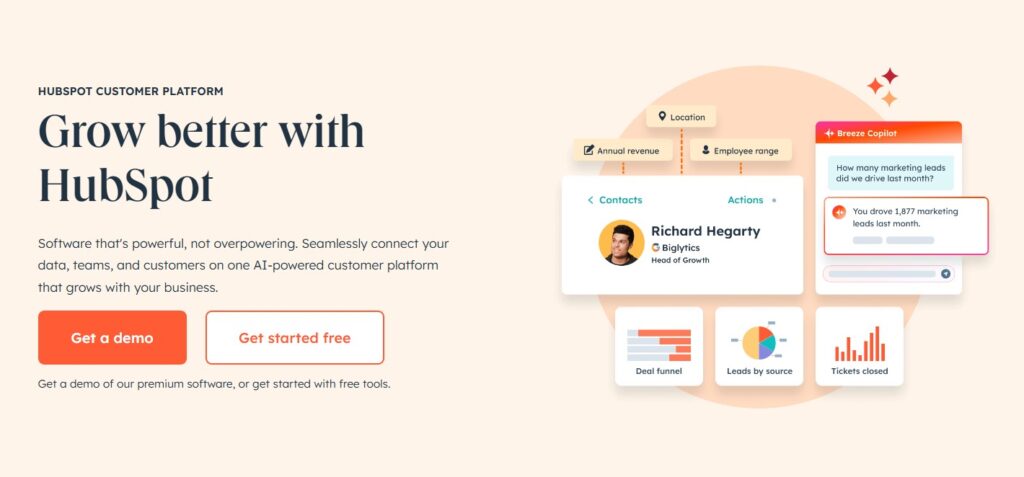
Best For: Complete CRM and marketing automation
HubSpot has evolved into an AI-powered marketing powerhouse with its comprehensive suite of tools. The platform’s AI features include content assistant, predictive lead scoring, and smart automation workflows.
Key Features:
- AI-powered content generation for emails, blog posts, and social media
- Predictive lead scoring and customer lifecycle stage prediction
- Automated email marketing with send time optimization
- Smart chatbots with natural language processing
- Advanced analytics with AI-driven insights
Pros: All-in-one solution, excellent integration capabilities, strong free tier Cons: Can be overwhelming for beginners, higher-tier features are expensive Pricing: Free tier available, paid plans from $45/month
Jasper.ai
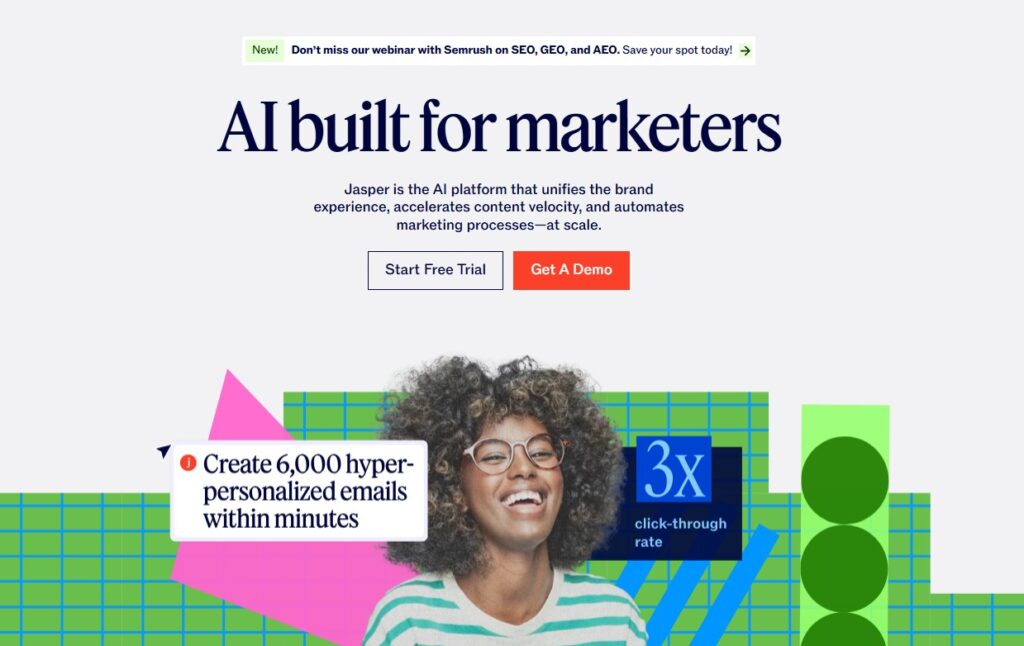
Best For: AI-powered content creation at scale
Jasper has established itself as the go-to platform for AI content generation, helping marketers create everything from blog posts to ad copy in minutes rather than hours.
Key Features:
- Advanced GPT-based content generation for over 50+ use cases
- Brand voice training to maintain consistency
- Template library for various content types
- SEO optimization suggestions
- Multi-language content creation
- Plagiarism detection and fact-checking
Pros: Exceptional content quality, extensive template library, brand voice consistency Cons: Requires human editing and oversight, subscription can be costly for small businesses Pricing: Plans start at $39/month for individuals
Zapier + ChatGPT Integration
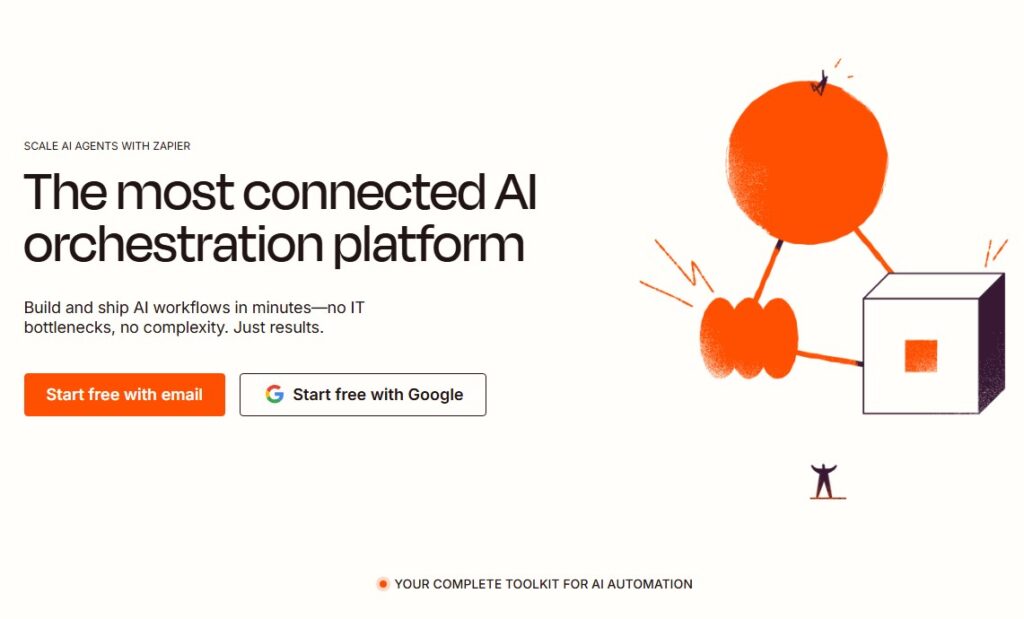
Best For: Custom campaign automation workflows
The combination of Zapier’s automation capabilities with ChatGPT’s AI intelligence creates powerful custom marketing workflows that adapt to your specific business needs.
Key Features:
- Connect 5,000+ apps with AI-powered automation
- Custom GPT prompts for personalized responses
- Multi-step automation workflows
- Conditional logic and branching
- Real-time data processing and responses
Pros: Highly customizable, extensive app integrations, cost-effective for complex workflows Cons: Requires technical setup knowledge, troubleshooting can be challenging Pricing: Zapier from $19.99/month, ChatGPT API usage-based pricing
AdCreative.ai
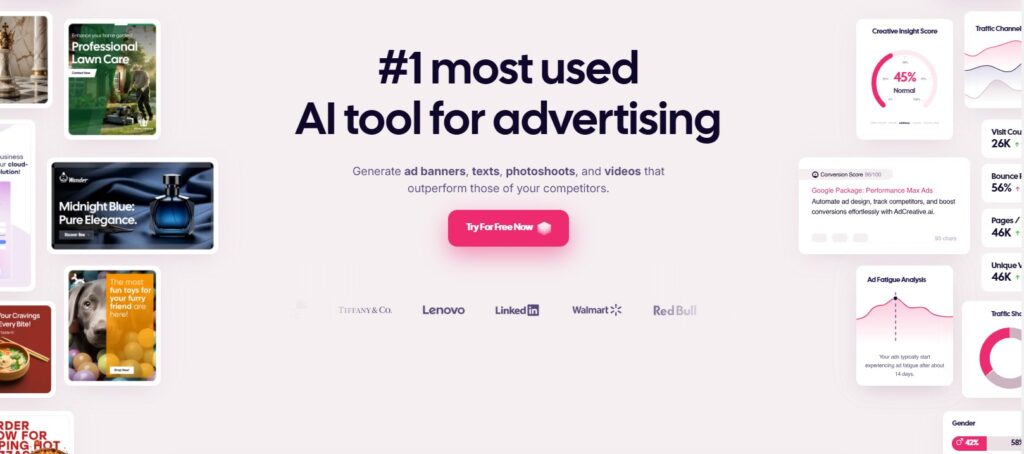
Best For: Generating high-converting ad creatives instantly
AdCreative.ai uses machine learning to generate and optimize ad creatives across multiple platforms, significantly reducing the time and cost of creative production.
Key Features:
- AI-generated ad creatives for Facebook, Google, LinkedIn, and more
- Creative scoring and performance prediction
- Brand kit integration for consistent branding
- A/B testing recommendations
- Text and headline generation
- Creative insights and optimization suggestions
Pros: Rapid creative generation, data-driven design decisions, platform-specific optimization Cons: Limited customization options, requires brand assets for best results Pricing: Plans start at $21/month
Surfer SEO
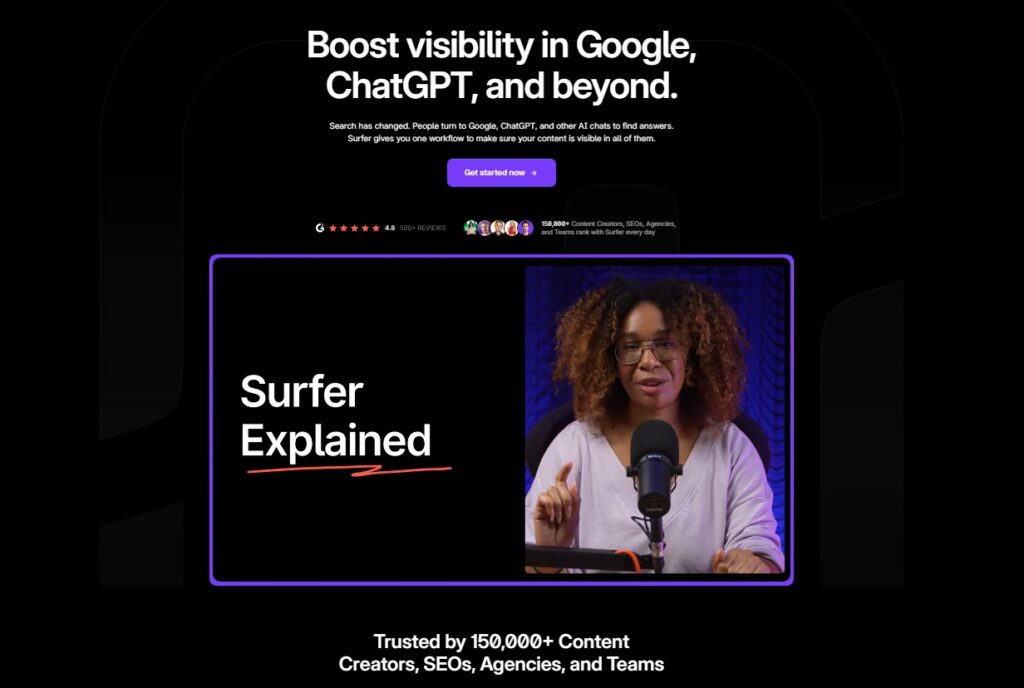
Best For: AI-enhanced content optimization for search engines
Surfer SEO combines AI with comprehensive SEO data to help create content that ranks higher in search results while maintaining readability and engagement.
Key Features:
- Real-time content optimization suggestions
- SERP analysis and competitor research
- AI-powered content editor with writing assistant
- Keyword research and content planning
- Content audit and optimization recommendations
- Integration with popular writing tools
Pros: Data-driven SEO recommendations, user-friendly interface, proven results Cons: Focused primarily on SEO, requires SEO knowledge to maximize value Pricing: Plans start at $69/month
Copy.ai

Best For: Quick AI copywriting for various marketing needs
Copy.ai excels at generating short-form marketing copy, making it perfect for social media posts, ad headlines, product descriptions, and email subject lines.
Key Features:
- 90+ copywriting templates and tools
- Brand voice customization
- Long-form content creation
- Sales copy and funnel optimization
- Social media content generation
- Email marketing templates
Pros: Easy to use, affordable pricing, quick content generation Cons: Limited long-form capabilities, requires editing for brand consistency Pricing: Free tier available, paid plans from $36/month
Klaviyo
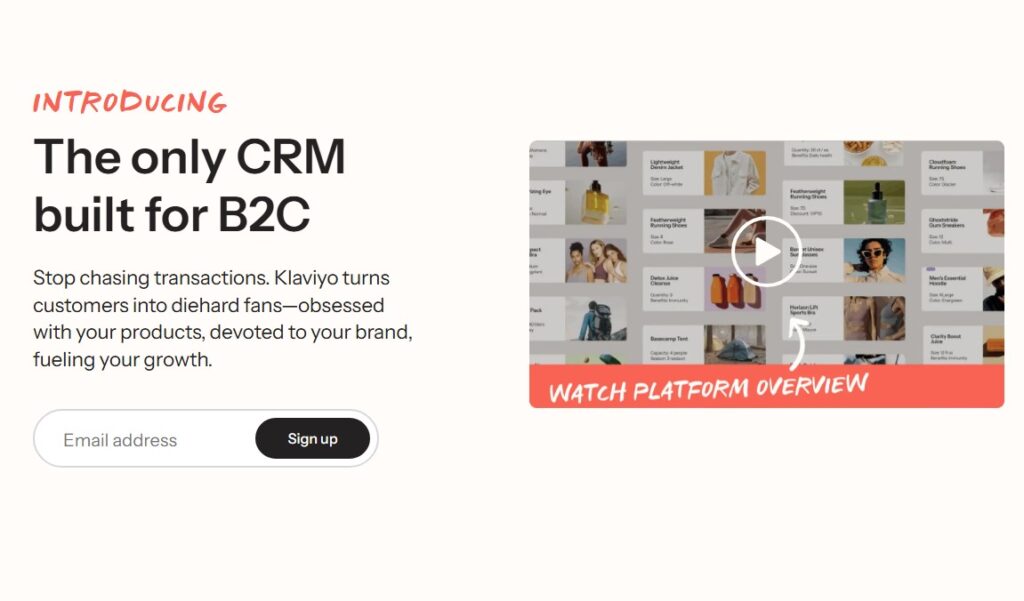
Best For: AI-driven email marketing and customer segmentation
Klaviyo’s AI capabilities shine in predictive analytics, automated email flows, and dynamic content personalization for e-commerce businesses.
Key Features:
- Predictive analytics for customer lifetime value
- Automated email and SMS flows
- Dynamic content personalization
- Advanced segmentation with AI recommendations
- Cross-channel campaign coordination
- Revenue attribution and ROI tracking
Pros: Powerful e-commerce integrations, excellent deliverability, comprehensive analytics Cons: Steep learning curve, pricing scales with contact volume Pricing: Free tier for up to 250 contacts, paid plans from $20/month
How to Choose the Right Tool
Selecting the perfect AI marketing tool for your business requires careful consideration of several factors:
Define Your Marketing Goals Start by identifying your primary marketing objectives. Are you looking to improve content creation efficiency, enhance email marketing performance, optimize ad spend, or gain better customer insights? Different tools excel in different areas, so clarity on your goals will guide your selection.
Know Your Budget AI marketing tools range from free options to enterprise solutions costing thousands per month. Factor in not just the subscription cost but also implementation time, training requirements, and potential productivity gains. Calculate the ROI based on time savings and improved performance metrics.
Look for Integrations with Your Existing Stack Evaluate how well potential tools integrate with your current marketing technology stack. Seamless integration prevents data silos and ensures smooth workflow transitions. Check for native integrations, API availability, and data synchronization capabilities.
Read User Reviews and Test Trials Take advantage of free trials and freemium versions to test tools with your actual marketing scenarios. Read reviews from businesses similar to yours, paying attention to comments about customer support, learning curve, and real-world performance.
Consider Team Skills and Resources Assess your team’s technical capabilities and available time for tool implementation and management. Some AI tools require minimal setup while others need significant configuration and ongoing optimization.
Implementation Best Practices
Start Small and Scale Gradually Begin with one or two core use cases rather than attempting to automate everything at once. Master the basics before expanding to more complex workflows and integrations.
Maintain Human Oversight AI tools are powerful assistants, not replacements for human judgment. Always review AI-generated content and campaign strategies before publishing or launching.
Monitor Performance Continuously Track key performance indicators to ensure your AI tools are delivering expected results. Be prepared to adjust parameters, retrain models, or switch tools if performance doesn’t meet expectations.
Invest in Team Training Provide adequate training for team members who will use these tools. Many vendors offer certification programs, webinars, and comprehensive documentation to help maximize tool effectiveness.
Final Thoughts
AI isn’t replacing marketers—it’s empowering them to achieve more with less effort. The tools highlighted in this guide represent the cutting edge of marketing automation, each offering unique strengths for different aspects of your marketing strategy. With the right AI marketing tools, you can streamline workflows, reach your audience more effectively, and scale your business with unprecedented efficiency.
The key to success lies not in adopting every available tool, but in choosing the right combination that aligns with your business goals, budget, and team capabilities. Start with your biggest pain points, implement gradually, and always measure results. As AI technology continues to evolve, businesses that embrace these tools today will have a significant competitive advantage tomorrow.
Remember, the best AI marketing tool is the one that your team actually uses consistently and that delivers measurable improvements to your marketing outcomes. Take time to evaluate your options, test thoroughly, and choose tools that will grow with your business. The investment in AI marketing automation today will pay dividends in saved time, improved performance, and accelerated growth for years to come.
FAQs
1. How much can AI marketing tools really save in terms of time and resources?
Most businesses report saving 20-40% of their marketing team’s time when implementing AI tools effectively. This translates to 8-16 hours per week for a full-time marketer. The cost savings extend beyond time—AI tools often improve campaign performance by 15-30%, reduce content creation costs by up to 50%, and decrease customer acquisition costs through better targeting. For a typical marketing team spending $10,000 monthly on campaigns, AI optimization can save $1,500-3,000 in improved ROI alone.
2. Do I need technical skills to use these AI marketing tools?
Most modern AI marketing tools are designed for marketers, not developers. Tools like HubSpot, Jasper.ai, and Copy.ai offer intuitive interfaces that require no coding knowledge. However, more advanced implementations like custom Zapier workflows or API integrations may benefit from basic technical understanding. The key is starting with user-friendly tools and gradually expanding to more sophisticated solutions as your team’s comfort level grows.
3. How do AI marketing tools handle data privacy and compliance?
Reputable AI marketing tools are built with privacy regulations like GDPR and CCPA in mind. They typically offer features like data encryption, user consent management, and data retention controls. However, it’s crucial to review each tool’s privacy policy and ensure they meet your industry’s specific compliance requirements. Always configure privacy settings appropriately and maintain transparency with customers about AI usage in your marketing communications.
4. Can AI marketing tools work effectively for small businesses with limited budgets?
Absolutely. Many AI marketing tools offer free tiers or affordable entry-level plans specifically designed for small businesses. For example, HubSpot’s free tier, Copy.ai’s basic plan at $36/month, and Zapier’s starter plan can provide significant value for small teams. The key is focusing on tools that address your biggest pain points first—whether that’s content creation, email automation, or social media management—rather than trying to implement everything at once.
5. How long does it typically take to see results from AI marketing tools?
The timeline varies by tool and implementation complexity. Simple tools like AI copywriters can show immediate results in content creation speed and quality. Email automation and social media scheduling tools typically show measurable improvements within 2-4 weeks. More sophisticated implementations like predictive analytics and advanced personalization may take 2-3 months to fully optimize and show significant ROI. The key is setting realistic expectations and tracking relevant metrics from day one.
6. What happens if an AI marketing tool makes mistakes or produces poor content?
AI tools are powerful assistants, not infallible replacements for human oversight. Always implement review processes for AI-generated content before publication. Most tools allow you to train their algorithms with feedback, improving accuracy over time. Establish quality control workflows, set up approval processes for critical communications, and maintain brand guidelines that AI tools can reference. Remember, the goal is AI-assisted marketing, not fully autonomous campaigns—human judgment remains essential for strategic decisions and brand consistency.